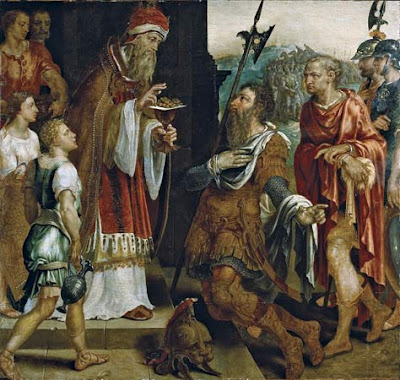
As our OT-1 course continued our overview of Genesis yesterday, a student pointed out how interesting is the figure of Melchizedek, king and priest of pre-Israelite Jerusalem ("Salem"). Indeed! Surely the encounter at Jerusalem recounted in Gen 14 lays bare before us a mysterious theme of universalism. God's work with Abraham ripples outward with a wide-ranging agenda. A great triangle of blessing begins here to connect Abraham's people and the world. Abraham has blessed a mass of non-Hebrews (Melchizedek's people) by ridding Canaan of predators (vv. 1-16). But God's blessing now (vv. 17-24) flows mysteriously back to Abraham through a non-Hebrew channel! The sacral power to bless that is associated with Jerusalem, i.e., Zion (the cosmic mountain), is not so tightly bound up with the chosen people as we might at first assume. The chosen people are instruments of a cosmic agenda that will tend to burst beyond their constructs and cultic standards (cf. how the paradigm of "Melchizedek" works in Psalm 110:4), although it is always their duty to claim, and to proclaim, the agenda as the work of Yahweh, and no other god. Melchizedek speaks of "God Most High" (vv. 19-20), but Abraham immediately specifies that his referent must be "Yahweh, God Most High" (v. 22).


0 Comments:
Post a Comment
<< Home